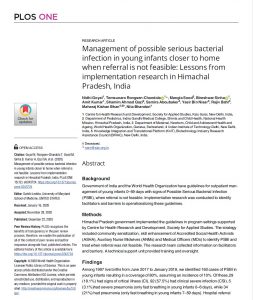
Background
Government of India and the World Health Organization have guidelines for outpatient management of young infants 0-59 days with signs of Possible Serious Bacterial Infection (PSBI), when referral is not feasible. Implementation research was conducted to identify facilitators and barriers to operationalizing these guidelines.
Methods
Himachal Pradesh government implemented the guidelines in program settings supported by Centre for Health Research and Development, Society for Applied Studies. The strategy included community sensitization, skill enhancement of Accredited Social Health Activists (ASHA), Auxiliary Nurse Midwives (ANMs) and Medical Officers (MOs) to identify PSBI and treat when referral was not feasible. The research team collected information on facilitators and barriers. A technical support unit provided training and oversight.
Findings
Among 1997 live births from June 2017 to January 2019, we identified 160 cases of PSBI in young infants resulting in a coverage of 80%, assuming an incidence of 10%. Of these,29(18.1%) had signs of critical illness (CI), 92 (57.5%) had clinical severe infection (CSI), 5 (3.1%)had severe pneumonia (only fast breathing in young infants 0-6 days), while 34 (21%) had pneumonia (only fast breathing in young infants 7-59 days). Hospital referral was accepted by 48/160 (30%), whereas 112/160 (70%) were treated with the simplified treatment regimens at primary level facilities. Of the 29 infants with CI, 18 (62%) accepted referral; 26 (90%) recovered while 3 (10%) who had accepted referral, died. Of the 92 infants who had CSI, 86 (93%) recovered, 65 (71%) received simplified treatment and one infant who had accepted referral, died. All the five infants who had severe pneumonia, recovered; 3 (60%) had received simplified treatment. Of the 34 pneumonia cases, 33 received simplified treatment of which 5 (15%) failed treatment; two out of these 5 died. Overall, 6/160 infants died (case-fatality-rate 3.4%); 2 in the simplified treatment (case-fatality-rate 1.8%) and 4 in the hospital group (case-fatality-rate 8.3%). Delayed identification and care-seeking by families and health system weaknesses like manpower gaps and interrupted supplies were challenges in implementation.